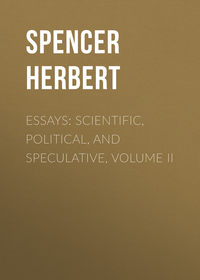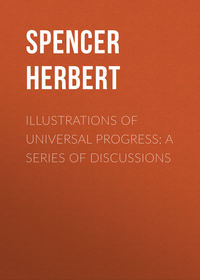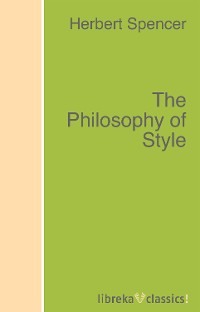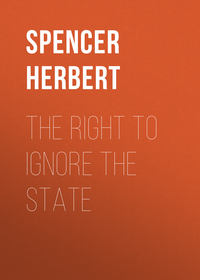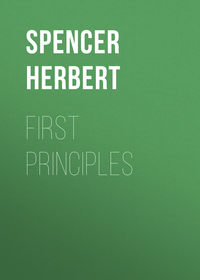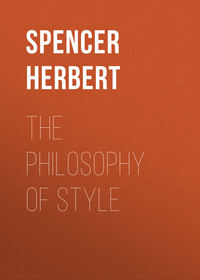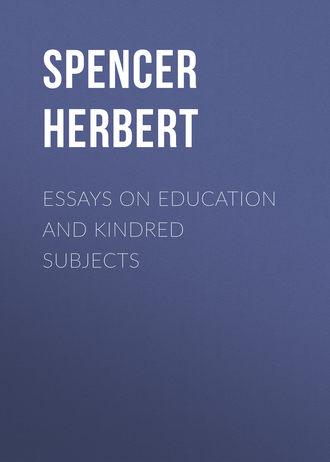 полная версия
полная версияEssays on Education and Kindred Subjects
Moreover, even were there methods by which the desired end could be at once effected; and even had fathers and mothers sufficient insight, sympathy, and self-command to employ these methods consistently; it might still be contended that it would be of no use to reform family-government faster than other things are reformed. What is it that we aim to do? Is it not that education of whatever kind has for its proximate end to prepare a child for the business of life – to produce a citizen who, while he is well conducted, is also able to make his way in the world? And does not making his way in the world (by which we mean, not the acquirement of wealth, but of the funds requisite for bringing up a family) – does not this imply a certain fitness for the world as it now is? And if by any system of culture an ideal human being could be produced, is it not doubtful whether he would be fit for the world as it now is? May we not, on the contrary, suspect that his too keen sense of rectitude, and too elevated standard of conduct, would make life intolerable or even impossible? And however admirable the result might be, considered individually, would it not be self-defeating in so far as society and posterity are concerned? There is much reason for thinking that as in a nation so in a family, the kind of government is, on the whole, about as good as the general state of human nature permits it to be. We may argue that in the one case, as in the other, the average character of the people determines the quality of the control exercised. In both cases it may be inferred that amelioration of the average character leads to an amelioration of system; and further, that were it possible to ameliorate the system without the average character being first ameliorated, evil rather than good would follow. Such degree of harshness as children now experience from their parents and teachers, may be regarded as but a preparation for that greater harshness which they will meet on entering the world. And it may be urged that were it possible for parents and teachers to treat them with perfect equity and entire sympathy, it would but intensify the sufferings which the selfishness of men must, in after life, inflict on them.2
"But does not this prove too much?" some one will ask. "If no system of moral training can forthwith make children what they should be; if, even were there a system that would do this, existing parents are too imperfect to carry it out; and if even could such a system be successfully carried out, its results would be disastrously incongruous with the present state of society; does it not follow that to reform the system now in use is neither practicable nor desirable?" No. It merely follows that reform in domestic government must go on, pari passu, with other reforms. It merely follows that methods of discipline neither can be nor should be ameliorated, except by instalments. It merely follows that the dictates of abstract rectitude will, in practice, inevitably be subordinated by the present state of human nature – by the imperfections alike of children, of parents, and of society; and can only be better fulfilled as the general character becomes better.
"At any rate, then," may rejoin our critic, "it is clearly useless to set up any ideal standard of family discipline. There can be no advantage in elaborating and recommending methods that are in advance of the time." Again we contend for the contrary. Just as in the case of political government, though pure rectitude may be at present impracticable, it is requisite to know where the right lies, in order that the changes we make may be towards the right instead of away from it; so, in the case of domestic government, an ideal must be upheld, that there may be gradual approximations to it. We need fear no evil consequences from the maintenance of such an ideal. On the average the constitutional conservatism of mankind is strong enough to prevent too rapid a change. Things are so organised that until men have grown up to the level of a higher belief, they cannot receive it: nominally, they may hold it, but not virtually. And even when the truth gets recognised, the obstacles to conformity with it are so persistent as to outlive the patience of philanthropists and even of philosophers. We may be sure, therefore, that the difficulties in the way of a normal government of children, will always put an adequate check upon the efforts to realise it.
With these preliminary explanations, let us go on to consider the true aims and methods of moral education. After a few pages devoted to the settlement of general principles, during the perusal of which we bespeak the reader's patience, we shall aim by illustrations to make clear the right methods of parental behaviour in the hourly occurring difficulties of family government.
When a child falls, or runs its head against the table, it suffers a pain, the remembrance of which tends to make it more careful; and by repetition of such experiences, it is eventually disciplined into proper guidance of its movements. If it lays hold of the fire-bars, thrusts its hand into a candle-flame, or spills boiling water on any part of its skin, the resulting burn or scald is a lesson not easily forgotten. So deep an impression is produced by one or two events of this kind, that no persuasion will afterwards induce it thus to disregard the laws of its constitution.
Now in these cases, Nature illustrates to us in the simplest way, the true theory and practice of moral discipline – a theory and practice which, however much they may seem to the superficial like those commonly received, we shall find on examination to differ from them very widely.
Observe, first, that in bodily injuries and their penalties we have misconduct and its consequences reduced to their simplest forms. Though, according to their popular acceptations, right and wrong are words scarcely applicable to actions that have none but direct bodily effects; yet whoever considers the matter will see that such actions must be as much classifiable under these heads as any other actions. From whatever assumption they start, all theories of morality agree that conduct whose total results, immediate and remote, are beneficial, is good conduct; while conduct whose total results, immediate and remote, are injurious, is bad conduct. The ultimate standards by which all men judge of behaviour, are the resulting happiness or misery. We consider drunkenness wrong because of the physical degeneracy and accompanying moral evils entailed on the drunkard and his dependents. Did theft give pleasure both to taker and loser, we should not find it in our catalogue of sins. Were it conceivable that kind actions multiplied human sufferings, we should condemn them – should not consider them kind. It needs but to read the first newspaper-leader, or listen to any conversation on social affairs, to see that acts of parliament, political movements, philanthropic agitations, in common with the doings of individuals are judged by their anticipated results in augmenting the pleasures or pains of men. And if on analysing all secondary superinduced ideas, we find these to be our final tests of right and wrong, we cannot refuse to class bodily conduct as right or wrong according to the beneficial or detrimental results produced.
Note, in the second place, the character of the punishments by which these physical transgressions are prevented. Punishments, we call them, in the absence of a better word; for they are not punishments in the literal sense. They are not artificial and unnecessary inflictions of pain; but are simply the beneficent checks to actions that are essentially at variance with bodily welfare – checks in the absence of which life would be quickly destroyed by bodily injuries. It is the peculiarity of these penalties, if we must so call them, that they are simply the unavoidable consequences of the deeds which they follow: they are nothing more than the inevitable reactions entailed by the child's actions.
Let it be further borne in mind that these painful reactions are proportionate to the transgressions. A slight accident brings a slight pain; a more serious one, a severer pain. It is not ordained that an urchin who tumbles over the doorstep, shall suffer in excess of the amount necessary; with the view of making it still more cautious than the necessary suffering will make it. But from its daily experience it is left to learn the greater or less penalties of greater or less errors; and to behave accordingly.
And then mark, lastly, that these natural reactions which follow the child's wrong actions, are constant, direct, unhesitating, and not to be escaped. No threats; but a silent, rigorous performance. If a child runs a pin into its finger, pain follows. If it does it again, there is again the same result: and so on perpetually. In all its dealing with inorganic Nature it finds this unswerving persistence, which listens to no excuse, and from which there is no appeal; and very soon recognising this stern though beneficent discipline, it becomes extremely careful not to transgress.
Still more significant will these general truths appear, when we remember that they hold throughout adult life as well as throughout infantine life. It is by an experimentally-gained knowledge of the natural consequences, that men and women are checked when they go wrong. After home-education has ceased, and when there are no longer parents and teachers to forbid this or that kind of conduct, there comes into play a discipline like that by which the young child is trained to self-guidance. If the youth entering on the business of life idles away his time and fulfils slowly or unskilfully the duties entrusted to him, there by and by follows the natural penalty: he is discharged, and left to suffer for awhile the evils of a relative poverty. On the unpunctual man, ever missing his appointments of business and pleasure, there continually fall the consequent inconveniences, losses, and deprivations. The tradesmen who charges too high a rate of profit, loses his customers, and so is checked in his greediness. Diminishing practice teaches the inattentive doctor to bestow more trouble on his patients. The too credulous creditor and the over-sanguine speculator, alike learn by the difficulties which rashness entails on them, the necessity of being more cautious in their engagements. And so throughout the life of every citizen. In the quotation so often made apropos of such cases – "The burnt child dreads the fire" – we see not only that the analogy between this social discipline and Nature's early discipline of infants is universally recognised; but we also see an implied conviction that this discipline is of the most efficient kind. Nay indeed, this conviction is more than implied; it is distinctly stated. Every one has heard others confess that only by "dearly bought experience" had they been induced to give up some bad or foolish course of conduct formerly pursued. Every one has heard, in the criticism passed on the doings of this spendthrift or the other schemer, the remark that advice was useless, and that nothing but "bitter experience" would produce any effect: nothing, that is, but suffering the unavoidable consequences. And if further proof be needed that the natural reaction is not only the most efficient penalty, but that no humanly-devised penalty can replace it, we have such further proof in the notorious ill-success of our various penal systems. Out of the many methods of criminal discipline that have been proposed and legally enforced, none have answered the expectations of their advocates. Artificial punishments have failed to produce reformation; and have in many cases increased the criminality. The only successful reformatories are those privately-established ones which approximate their regime to the method of Nature – which do little more than administer the natural consequences of criminal conduct: diminishing the criminal's liberty of action as much as is needful for the safety of society, and requiring him to maintain himself while living under this restraint. Thus we see, both that the discipline by which the young child is taught to regulate its movements is the discipline by which the great mass of adults are kept in order, and more or less improved; and that the discipline humanly-devised for the worst adults, fails when it diverges from this divinely-ordained discipline, and begins to succeed on approximating to it.
Have we not here, then, the guiding principle of moral education? Must we not infer that the system so beneficent in its effects during infancy and maturity, will be equally beneficent throughout youth? Can any one believe that the method which answers so well in the first and the last divisions of life, will not answer in the intermediate division? Is it not manifest that as "ministers and interpreters of Nature" it is the function of parents to see that their children habitually experience the true consequences of their conduct – the natural reactions: neither warding them off, nor intensifying them, nor putting artificial consequences in place of them? No unprejudiced reader will hesitate in his assent.
Probably, however, not a few will contend that already most parents do this – that the punishments they inflict are, in the majority of cases, the true consequences of ill-conduct – that parental anger, venting itself in harsh words and deeds, is the result of a child's transgression – and that, in the suffering, physical or moral, which the child is subject to, it experiences the natural reaction of its misbehaviour. Along with much error this assertion contains some truth. It is unquestionable that the displeasure of fathers and mothers is a true consequence of juvenile delinquency; and that the manifestation of it is a normal check upon such delinquency. The scoldings, and threats, and blows, which a passionate parent visits on offending little ones, are doubtless effects actually drawn from such a parent by their offences; and so are, in some sort, to be considered as among the natural reactions of their wrong actions. Nor are we prepared to say that these modes of treatment are not relatively right – right, that is, in relation to the uncontrollable children of ill-controlled adults; and right in relation to a state of society in which such ill-controlled adults make up the mass of the people. As already suggested, educational systems, like political and other institutions, are generally as good as the state of human nature permits. The barbarous children of barbarous parents are probably only to be restrained by the barbarous methods which such parents spontaneously employ; while submission to these barbarous methods is perhaps the best preparation such children can have for the barbarous society in which they are presently to play a part. Conversely, the civilised members of a civilised society will spontaneously manifest their displeasure in less violent ways – will spontaneously use milder measures – measures strong enough for their better-natured children. Thus it is true that, in so far as the expression of parental feeling is concerned, the principle of the natural reaction is always more or less followed. The system of domestic government ever gravitates towards its right form.
But now observe two important facts. The first fact is that, in states of rapid transition like ours, which witness a continuous battle between old and new theories and old and new practices, the educational methods in use are apt to be considerably out of harmony with the times. In deference to dogmas fit only for the ages that uttered them, many parents inflict punishments that do violence to their own feelings, and so visit on their children unnatural reactions; while other parents, enthusiastic in their hopes of immediate perfection, rush to the opposite extreme. The second fact is, that the discipline of chief value is not the experience of parental approbation or disapprobation; but it is the experience of those results which would ultimately flow from the conduct in the absence of parental opinion or interference. The truly instructive and salutary consequences are not those inflicted by parents when they take upon themselves to be Nature's proxies; but they are those inflicted by Nature herself. We will endeavour to make this distinction clear by a few illustrations, which, while they show what we mean by natural reactions as contrasted with artificial ones, will afford some practical suggestions.
In every family where there are young children there daily occur cases of what mothers and servants call "making a litter." A child has had out its box of toys, and leaves them scattered about the floor. Or a handful of flowers, brought in from a morning walk, is presently seen dispersed over tables and chairs. Or a little girl, making doll's-clothes, disfigures the room with shreds. In most cases the trouble of rectifying this disorder falls anywhere but where it should. Occurring in the nursery, the nurse herself, with many grumblings about "tiresome little things," undertakes the task; if below-stairs, the task usually devolves either on one of the elder children or on the housemaid: the transgressor being visited with nothing more than a scolding. In this very simple case, however, there are many parents wise enough to follow out, more or less consistently, the normal course – that of making the child itself collect the toys or shreds. The labour of putting things in order is the true consequence of having put them in disorder. Every trader in his office, every wife in her household, has daily experience of this fact. And if education be a preparation for the business of life, then every child should also, from the beginning, have daily experience of this fact. If the natural penalty be met by refractory behaviour (which it may perhaps be where the system of moral discipline previously pursued has been bad), then the proper course is to let the child feel the ulterior reaction caused by its disobedience. Having refused or neglected to pick up and put away the things it has scattered about, and having thereby entailed the trouble of doing this on some one else, the child should, on subsequent occasions, be denied the means of giving this trouble. When next it petitions for its toy-box, the reply of its mamma should be – "The last time you had your toys you left them lying on the floor, and Jane had to pick them up. Jane is too busy to pick up every day the things you leave about; and I cannot do it myself. So that, as you will not put away your toys when you have done with them, I cannot let you have them." This is obviously a natural consequence, neither increased nor lessened; and must be so recognised by a child. The penalty comes, too, at the moment when it is most keenly felt. A new-born desire is balked at the moment of anticipated gratification; and the strong impression so produced can scarcely fail to have an effect on the future conduct: an effect which, by consistent repetition, will do whatever can be done in curing the fault. Add to which, that, by this method, a child is early taught the lesson which cannot be learnt too soon, that in this world of ours pleasures are rightly to be obtained only by labour.
Take another case. Not long since we had frequently to hear the reprimands visited on a little girl who was scarcely ever ready in time for the daily walk. Of eager disposition, and apt to become absorbed in the occupation of the moment, Constance never thought of putting on her things till the rest were ready. The governess and the other children had almost invariably to wait; and from the mamma there almost invariably came the same scolding. Utterly as this system failed, it never occurred to the mamma to let Constance experience the natural penalty. Nor, indeed, would she try it when it was suggested to her. In the world, unreadiness entails the loss of some advantage that would else have been gained: the train is gone; or the steam-boat is just leaving its moorings; or the best things in the market are sold; or all the good seats in the concert-room are filled. And every one, in cases perpetually occurring, may see that it is the prospective deprivations which prevent people from being too late. Is not the inference obvious? Should not the prospective deprivations control a child's conduct also? If Constance is not ready at the appointed time, the natural result is that of being left behind, and losing her walk. And after having once or twice remained at home while the rest were enjoying themselves in the fields – after having felt that this loss of a much-prized gratification was solely due to want of promptitude; amendment would in all probability take place. At any rate, the measure would be more effective than that perpetual scolding which ends only in producing callousness.
Again, when children, with more than usual carelessness, break or lose the things given to them, the natural penalty – the penalty which makes grown-up persons more careful – is the consequent inconvenience. The lack of the lost or damaged article, and the cost of replacing it, are the experiences by which men and women are disciplined in these matters; and the experiences of children should be as much as possible assimilated to theirs. We do not refer to that early period at which toys are pulled to pieces in the process of learning their physical properties, and at which the results of carelessness cannot be understood; but to a later period, when the meaning and advantages of property are perceived. When a boy, old enough to possess a penknife, uses it so roughly as to snap the blade, or leaves it in the grass by some hedge-side where he was cutting a stick, a thoughtless parent, or some indulgent relative, will commonly forthwith buy him another, not seeing that, by doing this, a valuable lesson is prevented. In such a case, a father may properly explain that penknives cost money, and that to get money requires labour; that he cannot afford to purchase new penknives for one who loses or breaks them; and that until he sees evidence of greater carefulness he must decline to make good the loss. A parallel discipline will serve to check extravagance.
These few familiar instances, here chosen because of the simplicity with which they illustrate our point, will make clear to every one the distinction between those natural penalties which we contend are the truly efficient ones, and those artificial penalties commonly substituted for them. Before going on to exhibit the higher and subtler applications of the principle exemplified, let us note its many and great superiorities over the principle, or rather the empirical practice, which prevails in most families.
One superiority is that the pursuance of it generates right conceptions of cause and effect; which by frequent and consistent experience are eventually rendered definite and complete. Proper conduct in life is much better guaranteed when the good and evil consequences of actions are understood, than when they are merely believed on authority. A child who finds that disorderliness entails the trouble of putting things in order, or who misses a gratification from dilatoriness, or whose carelessness is followed by the want of some much-prized possession, not only suffers a keenly-felt consequence, but gains a knowledge of causation: both the one and the other being just like those which adult life will bring. Whereas a child who in such cases receives a reprimand, or some factitious penalty, not only experiences a consequence for which it often cares very little, but misses that instruction respecting the essential natures of good and evil conduct, which it would else have gathered. It is a vice of the common system of artificial rewards and punishments, long since noticed by the clear-sighted, that by substituting for the natural results of misbehaviour certain tasks or castigations, it produces a radically wrong moral standard. Having throughout infancy and boyhood always regarded parental or tutorial displeasure as the chief result of a forbidden action, the youth has gained an established association of ideas between such action and such displeasure, as cause and effect. Hence when parents and tutors have abdicated, and their displeasure is not to be feared, the restraints on forbidden actions are in great measure removed: the true restraints, the natural reactions, having yet to be learnt by sad experience. As writes one who has had personal knowledge of this short-sighted system: – "Young men let loose from school, particularly those whose parents have neglected to exert their influence, plunge into every description of extravagance; they know no rule of action – they are ignorant of the reasons for moral conduct – they have no foundation to rest upon – and until they have been severely disciplined by the world are extremely dangerous members of society."


